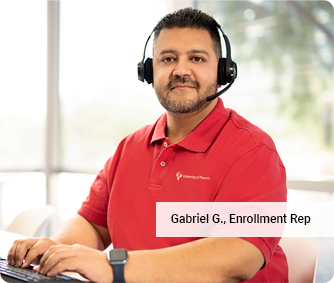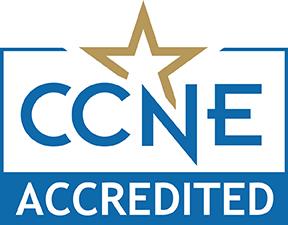
Online Psychiatric Mental Health Nurse Practitioner Program
Master of Science in Nursing / Psychiatric Mental Health Nurse Practitioner
Prepare for a role as an advanced practice registered nurse (APRN) specializing in neuropsychiatric care and treatment with a Master of Science in Nursing/Psychiatric Mental Health Nurse Practitioner degree. Learn skills such as neuropsychiatric disorder prevention, assessment, self-care management, psychotherapeutic intervention, pharmacological management, and addiction services. Gain the knowledge to treat psychiatric disorders in various healthcare settings and in diverse patient populations. Graduates are eligible to sit for the American Nurses Credentialing Center (ANCC) Psychiatric-Mental Health Nurse Practitioner (PMHNP) national board certification exam.
Nurse Bridge Program
If you have an active RN license and a bachelor’s degree in an unrelated field, our Nursing Bridge Program helps experienced nurses like you earn your MSN degree — saving you time and money. You’ll start with three BSN courses and then move into the program specialty that fits your career goals.
Ignite Your Passion
Start when you're ready
Register by:
Courses
Browse courses for your online MSN/PMH degree
Education should hold practical value. That’s why our courses meet rigorous academic standards and provide you with skills and knowledge immediately applicable to your career.
Program Handbook: Nursing Student Program Handbook
Look for this icon to see which skills you’ll learn in a course.
Requirements: 52 credits
You’ll need 52 credits to complete the Master of Science in Nursing/Psychiatric Mental Health Nurse Practitioner degree. Your course schedule may vary based on transferable credits or credits earned through the University’s Prior Learning Assessment.
Schedule
Your academic counselor will help you schedule your courses for the Master of Science in Nursing/Psychiatric Mental Health Nurse Practitioner degree.
Program Purpose Statement
Master of Science in Nursing/Psychiatric Mental Health Nurse Practitioner (MSN/PMH) program prepares registered nurses (RNs) for advanced practice as a PMHNP. In this role, the advanced practice registered nurse (APRN) holistically cares for patients with neuropsychiatric/mental disorders to include the prescribing of psychotropic medication, the provision of psychotherapy and addiction services, and the promotion of selfcare management skills. Graduates of the MSN/PMH program are eligible to sit for the American Nurses Credentialing Center (ANCC) PMHNP national certification examination.
Tuition
Paying for school
Tuition is charged per credit in a course. Courses are typically 4 credits, but can range from 4-8 credits. Costs do not include savings opportunities like transfer credits and scholarships.
What affects the overall cost of my program?
Your full program cost can vary by:
- Savings opportunities. Get your degree faster and for less with eligible transfer credits, scholarships and work experience credits. Students with eligible credits and relevant experience can save up to $6,800 and 9 credits off their master’s degree.
With our Tuition Guarantee, you pay one flat, affordable rate from the moment you enroll to the day you graduate from your program.
Earn your master’s degree faster and for less with eligible savings opportunities:
Other ways to save on time and tuition
Because we believe everyone deserves an affordable education, we work hard to help our students achieve one. Here’s a few ways you can save time, save money and avoid starting from scratch.
Transfer credits
Your prior eligible college credits can lower your cost and help you graduate sooner. As a transfer-friendly university, we accept eligible credits from 5,000+ accredited institutions.
Employer tuition benefits
Are you employed? Check to see if your employer has an alliance agreement with us for education benefits. This can help you save money while gaining skills that could apply to your job.
Credit for life experience
We look at all your relevant experience, from parenting to past jobs, to help you get the college credits you deserve. For every 3 credits earned, shave 6 weeks off your degree.
- View 1
- View 2

Budget & borrow
How to pay for college
Paying for school can be intimidating, but we’re here to help you make sense of it. Our finance advisors can walk you through your options like federal financial aid and savings opportunities to minimize your debt. Plus, we can help you figure out your financial plan.
Careers & Outcomes
What can you do with a Master of Science in Nursing/ Psychiatric Mental Health Nurse Practitioner degree?
Discover where your degree might take you and make informed choices about your future.
An MSN/PMH can help prepare you for:
- Advanced Practice Psychiatric Nurse
- Psychiatric Mental Health Nurse Practitioner
- Adult Psychiatric Mental Health Nurse Practitioner
- Nurse Practitioner (NP)
- Advanced Practice Registered Nurse (APRN)
Top skills learned in this program:
Assessment
Diagnosis
Treatment of Neuropsychiatric/Mental Disorders
Our MSN/PMH program meets the educational requirements in Alaska, Arizona, Arkansas, Colorado, Florida, Hawaii, Indiana, Michigan, Montana, Nevada, New Mexico, Ohio, Oklahoma, South Carolina, and Texas for graduates who want to pursue advanced practice nursing licensure and certification at the master’s level. The program is currently available online to residents of these states.
Check for additional information about professional licensure in your state of residence.

Ready to get started?
Start your application for free or request additional information.
What you’ll learn
With a Master of Science in Nursing/ Psychiatric Mental Health Nurse Practitioner degree you will be equipped with concrete skills that will help you provide patient care in the advanced practice role. You’ll learn how to:
- Synthesize advanced practice assessment to generate accurate clinical decisions
- Integrate theory and evidence to provide holistic healthcare services to improve or maintain optimum health for all family members
- Manage holistic healthcare for individuals and diverse populations across the lifespan
- Integrate ethical principles in delivering care to patients across the lifespan
- Synthesize state Nurse Practice Acts and/or regulatory guidelines to practice lawfully
- Apply principles of quality and safety to improve patient-centered outcomes across the lifespan
40% Growth
According to the Bureau of Labor Statistics , job growth for nurse practitioners is projected to be much faster than average between 2023 and 2033.
The BLS Projected Growth for 2023-2033 is published by the US Bureau of Labor Statistics. This data reflects the BLS’ projections of national (not local) conditions. These data points are not specific to University of Phoenix students or graduates.
Admissions
Apply for free – no application fee, no obligation.
Starting your degree is a big decision — and we want you to feel great about it. That’s why we remove obstacles from your application.
- No cost to request prior transcripts
- No GMAT
- No essay required
How to enroll at University of Phoenix

Gabriel G., Enrollment Rep
Receive 1-on-1 support
You have a support team of real people you can lean on. And our academic counselors, who are with you every step of the way, have earned a 5-star rating from 85% of our surveyed students.[1]
[1] Transactional Survey, September 2022-August 2023 (23,739 respondents)
Start a conversation with an enrollment representative today.
Call us at 844-937-8679 or chat with us 7 days a week.
Receive 1-on-1 support
You have a support team of real people you can lean on. And our academic counselors, who are with you every step of the way, have earned a 5-star rating from 90% of our surveyed students.[1] Start a conversation with an enrollment representative today.
[1] Transactional Survey, August 2021-22 (18,645 respondents)

Call or chat with us 7 days a week.
Student Experience
An education that fits your busy life
Balancing family, work and school
Work toward your degree without giving up what matters most. Start your degree year-round and take one class at a time.
Online learning
Enroll in online classes and attend class whenever it fits your life, day or night.
Around-the-clock support and resources
You have a support team available up to 14 hours a day, 5 days a week.
Computer requirements for courses
Many course assignments will require you to use a computer to complete and submit your assignment.

Faculty Spotlight
Professionals dedicated to you
Your success is a top priority for our deans and faculty members. They bring an average of 28+ years of experience and hands-on perspective to the classroom, and help bridge the gap between academics and industry knowledge.
Accreditation
Count on the quality of your education
programmatic accreditation
The baccalaureate degree program in nursing, master's degree program in nursing, and Doctor of Nursing Practice program at the University of Phoenix are accredited by the Commission on Collegiate Nursing Education 655 K Street, NW, Suite 750, Washington, DC 20001, 202-887-6791.
This program is aligned with leading industry organizations, such as:
- American Association of Colleges of Nursing (AACN)
- American Nurses Credentialing Center (ANCC)
- Quality & Safety Education for Nurses (QSEN)


Psychiatric mental health nurse practitioner articles
Frequently asked questions about the Master of Science in Nursing/Psychiatric Mental Health Nurse Practitioner degree
Current RN license required.
While widely available, not all programs are available to residents of all states. Please check with a University Enrollment Representative.





